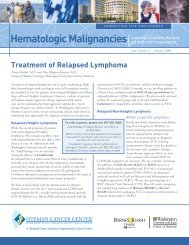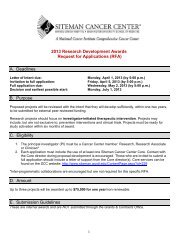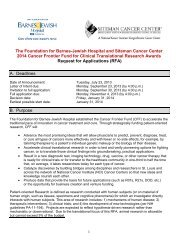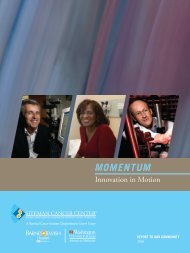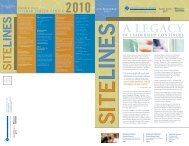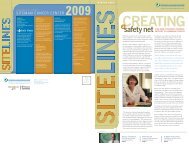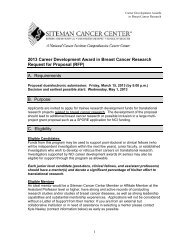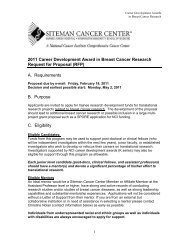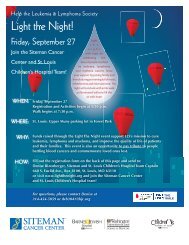Annual Report to Stakeholders 2011-2012 - Siteman Cancer Center ...
Annual Report to Stakeholders 2011-2012 - Siteman Cancer Center ...
Annual Report to Stakeholders 2011-2012 - Siteman Cancer Center ...
You also want an ePaper? Increase the reach of your titles
YUMPU automatically turns print PDFs into web optimized ePapers that Google loves.
Program for the Elimination of <strong>Cancer</strong> Disparities (PECaD)<br />
related organizations. This is a logical observation, but perhaps points <strong>to</strong> a need <strong>to</strong><br />
continue looking for ways <strong>to</strong> involve non-health organizations in our efforts.<br />
Evaluation of Program Reach and Implementation<br />
In this second round of NCI funding for PECaD, we have developed a framework for<br />
evaluation within and across our Community Outreach and Education, Research and<br />
Training Programs. We are using a computer database system <strong>to</strong> evaluate and track<br />
our reach and implementation over the course of the funding <strong>to</strong> adjust our short- and<br />
long-term goals <strong>to</strong>ward reducing health disparities in the region. All activities and<br />
events related <strong>to</strong> PECaD are reported along with information about the target<br />
audience, number of people reached, linkage <strong>to</strong> PECaD and more. The database is<br />
maintained by program staff and measures are in place <strong>to</strong> ensure quality and<br />
consistency of the data.<br />
Commitment <strong>to</strong> Community Engagement Principles<br />
In early <strong>2011</strong>, mid-way in<strong>to</strong> our first year of the second round of funding, PECaD's<br />
internal leadership conducted a survey <strong>to</strong> evaluate its adherence <strong>to</strong> and<br />
implementation of community-based participa<strong>to</strong>ry approaches and community<br />
engagement principles. The online survey was sent <strong>to</strong> people who have worked or are<br />
currently working with PECaD in a collaborative and significant way <strong>to</strong> achieve<br />
program objectives, including cancer survivors, volunteers, researchers at academic<br />
institutions, and employees from local advocacy and health care organizations. Thirty<br />
percent of respondents classified themselves as an employee or volunteer at a<br />
community-based organization, 26% as a healthcare professional, 34% as an<br />
academic researcher, and 10% as a cancer survivor or caregiver.<br />
In the survey, we asked how satisfied respondents were with their influence in<br />
PECaD. Seventy percent reported they are satisfied or very satisfied with their level of<br />
influence. This held true for all respondent classifications. Overall, 79% of<br />
respondents rated the program as highly effective in upholding elements essential <strong>to</strong><br />
community engagement and community-based participa<strong>to</strong>ry approaches. These<br />
results also held true in general for all respondent classifications. Length of<br />
involvement in the program was steady; some respondents were new <strong>to</strong> PECaD and<br />
others have been involved since the very beginning of the program in 2003. The<br />
survey also revealed some areas for improvement. Because of the program’s fast<br />
growth, respondents feel that can be difficult <strong>to</strong> keep track of everything going on.<br />
Respondents also want PECaD <strong>to</strong> share invitations <strong>to</strong> attend various<br />
academic/clinical presentations on campus. PECaD is working <strong>to</strong> implement these<br />
insightful suggestions.<br />
10



